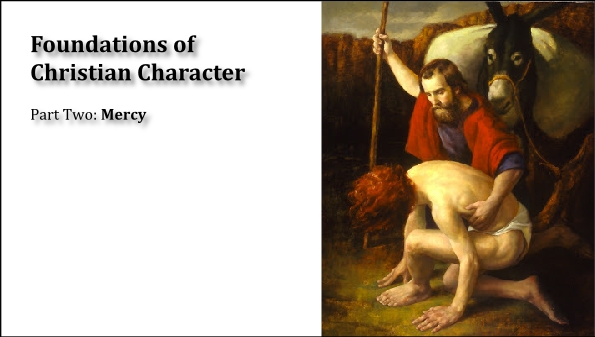By Tyson Thorne

In this foundations series we will be discussing three primary aspects of Christian character: Justice, mercy and love. This is part two.
Mercy is one of those words that smacks of the “old school.” Its often used by Catholic institutions, like “Mercy Hospital” and “Mercy Interventions”, but outside of certain circles it’s a word that’s largely lost, replaced by less sufficient ones like “kindness” and “goodness”. It’s sad, really, since it carries such weight throughout both Testaments and is intended to be one of the greatest marks of the believer – second only to Love. We are told, “Blessed are the merciful, for they will be shown mercy” (Matthew 5.7), and in light of the human condition we learned about yesterday, Mercy is something we all need.
Both hesed (the Hebrew word for mercy in the Old Testament), as well as eleos (the Greek word used in the LXX and the New Testament) signify active expressions of God's love toward mankind. In the Old Testament the manifestation was in the form of the calling and directing of the chosen people, and in the New Testament they were in the form of the sending of the Son of God into the world and in the work of redemption. What could be of greater importance to God’s people than Mercy?
I often think that the Jewish people have one up on us when it comes to understanding God. They’ve known him longer than we Gentiles, and have all kinds of traditions and festivals to prove it. For that reason I’m going to introduce the reader to a Jewish custom based on Exodus 34.6-.7:
The Lord passed by before him and proclaimed: “The Lord, the Lord, the compassionate and gracious God, slow to anger, and abounding in loyal love and faithfulness, keeping loyal love for thousands, forgiving iniquity and transgression and sin. But he by no means leaves the guilty unpunished, responding to the transgression of fathers by dealing with children and children’s children, to the third and fourth generation.”
The context of this passage is important. After Moses had spent some time on the mountain with God, the people began a rebellion. They collected gold and fashioned it into a golden calf to worship, and credited it with leading them out of Egypt. Moses worried for his people because he believed so much in the justice of God; he could not comprehend how limitless God’s mercy can be. It was after they had been found out that the people turned and recognized God’s mercy for themselves, and stated it beautifully in the verses above. To this day the Jewish people recite the Thirteen Attributes of Mercy based on this passage, and it is something we Christ-followers would do well to understand.
The 13 attributes begins with a calling out to God. “The Lord!” (Adonai) first reminds the people that God is merciful to us even before a person sins. God knows our hearts and is aware that sin is waiting to catch us up, and even in this fallen condition he shows us mercy. The second cry of Gods name, “The Lord!” (again, Adonai) reminds us that God is merciful even after we have sinned. When we least deserve it, he continues to show great mercy.
Next in the Hebrew construct of the verse is “God” (El, a different name for God than Adonai) indicates that God is all powerful, capable of wiping out everyone, and yet his mercy surpasses even greatness signified by his name. Language cannot express the scope of his power any more than it can the breadth of his mercy.
What is translated as “loyal love” in English is rahum in the Hebrew and describes God as being filled with loving sympathy, loyal so as to never lead on into temptation, and loving to the point of easing the punishment of the guilty. Likewise, the second occurrence of the phrase is the word v’hanun indicating God shows mercy even to the undeserving. He lifts up the oppressed and consoles the afflicted.
He is slow to anger (ereh apayim), giving ample time for the sinner to reflect and repent.
God is abundant in kindness (v’rav hesed) toward those without any personal qualities whatsoever, providing even them with greater mercies and gifts than deserved. God literally “tips the balance” in their favor.
God is Truth (v’emet) and never goes back on his word.
He is the preserver of kindness for a thousand generations (notzeir hesed la-alafim) remembering the righteousness of ones ancestors in order to benefit a less virtuous generation.
He is the forgiver of iniquity (nosei avon) forgiving intentional sin so long as one repents, long-sufferer of rebels (pasha) who intentionally war against God, giving them ample time to repent, and forgiver of error – those sins committed out of carelessness or recklessness.
It is he who cleanses (v’nakeh), mercifully wiping away the sins of the repentant. There is a reminder at the end however, of the need for repentance and penitence, for if one does not turn away from their sin, God does not cleanse.
What a remarkable picture of our God. No wonder Jesus tells us, “blessed are the merciful,” for beautiful are they who clearly reveal the nature of our Lord. Tomorrow we will examine Love, and next week we’ll tie all this together into a cohesive whole that the believer can live up to, and live out before a fallen world.
|
|
|
